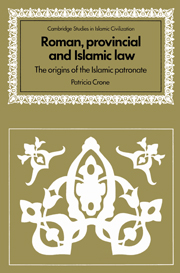Book contents
- Frontmatter
- Contents
- Preface
- 1 The state of the field
- 2 A practical guide to the study of Islamic law
- 3 The Islamic patronate
- 4 The case against Arabia
- 5 The case against the non-Roman Near East: paramonē
- 6 The case for the Roman Near East
- 7 Conclusion
- Appendices
- 1 The slavegirl's twins
- 2 Goldziher on Roman and Islamic law
- 3 The muḥtasib
- 4 Paramonar manumission as tadbīr
- Notes
- Works cited
- Index
1 - The slavegirl's twins
Published online by Cambridge University Press: 16 October 2009
- Frontmatter
- Contents
- Preface
- 1 The state of the field
- 2 A practical guide to the study of Islamic law
- 3 The Islamic patronate
- 4 The case against Arabia
- 5 The case against the non-Roman Near East: paramonē
- 6 The case for the Roman Near East
- 7 Conclusion
- Appendices
- 1 The slavegirl's twins
- 2 Goldziher on Roman and Islamic law
- 3 The muḥtasib
- 4 Paramonar manumission as tadbīr
- Notes
- Works cited
- Index
Summary
What happens if a man promises his slavegirl freedom on condition that her first child is a boy, whereupon she has twins, one boy and one girl? This curious question was discussed by Roman and Muslim lawyers alike. Ulpian held that the boy is presumed to have been born first, irrespective of fact, so that the mother is freed and the daughter born free (Buckland, Slavery, p. 487, citing Digest, 34, 5, 10, 1). But this solution was too simple for the Muslims.
‘When someone says to his slavegirl, “if the first child you bear is a boy, then you are free”, and she bears a boy and a girl without it being known who was born first, then half of the mother and half of the girl are freed while the son remains a slave. This is because both of the two [females] are [wholly] freed in one circumstance, namely when the son is born first – the mother in accordance with the condition and the girl by following her mother, who is free by the time she is born. And both remain [wholly] slaves in another circumstance, namely when the girl is born first – the condition having failed. So [when the order is not known], both are half freed and must work off the other half' (Marghīnānī, Hidāya, part ii, p. 62, with a discussion of rules to be followed if the order is disputed)
- Type
- Chapter
- Information
- Roman, Provincial and Islamic LawThe Origins of the Islamic Patronate, pp. 100 - 101Publisher: Cambridge University PressPrint publication year: 1987

